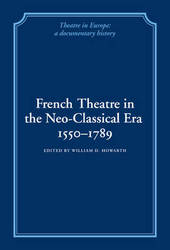
|
French Theatre in the Neo-classical Era, 1550-1789
Hardback
Main Details
| Title |
French Theatre in the Neo-classical Era, 1550-1789
|
| Authors and Contributors |
Edited by William D. Howarth
|
| Series | Theatre in Europe: A Documentary History |
|---|
| Physical Properties |
| Format:Hardback | | Pages:762 | | Dimensions(mm): Height 236,Width 158 |
|
| Category/Genre | Drama |
|---|
| ISBN/Barcode |
9780521230131
|
| Classifications | Dewey:792.0944 |
|---|
| Audience | | Professional & Vocational | |
|---|
| Illustrations |
129 Halftones, unspecified
|
|
Publishing Details |
| Publisher |
Cambridge University Press
|
| Imprint |
Cambridge University Press
|
| Publication Date |
5 June 1997 |
| Publication Country |
United Kingdom
|
Description
This book covers the period which saw the establishment in France of a centralised official theatre - not only the Comedie-Francaise (the first 'national' theatre), but an Italian theatre and a state Opera; the often subversive independent theatres are also discussed. Nearly 1,000 documents, most newly translated and many published for the first time, deal with censorship and other aspects of external control, company management, the acting profession, dramatic theory and criticism, theatre architecture, settings and costumes, audience composition and behaviour. Over 120 pictorial documents - architectural drawings, technical engravings, frontispieces, portraits, etc. - provide a visual dimension where relevant. A full linking narrative and a copious bibliography help to make this an important reference work and a valuable research tool.
Reviews'The book is put together by a team of specialists in theatre history. It presents a very complete picture - all the main documents are present, at least in extract. But the beauty of this collection is that it is a serious and comprehensive research tool, which yet leaves the reader's imagination free to roam.' Times Literary Supplement 'Vibrant with life and movement, and offering a wealth of factual detail on costs, costumes, scenery, stage design and special effects, and abundant anecdotal evidence about the trials and tribulations of an actor's life, this documentary history will be much appreciated by the teachers and students for whom it is intended.' New Theatre Quarterly
|